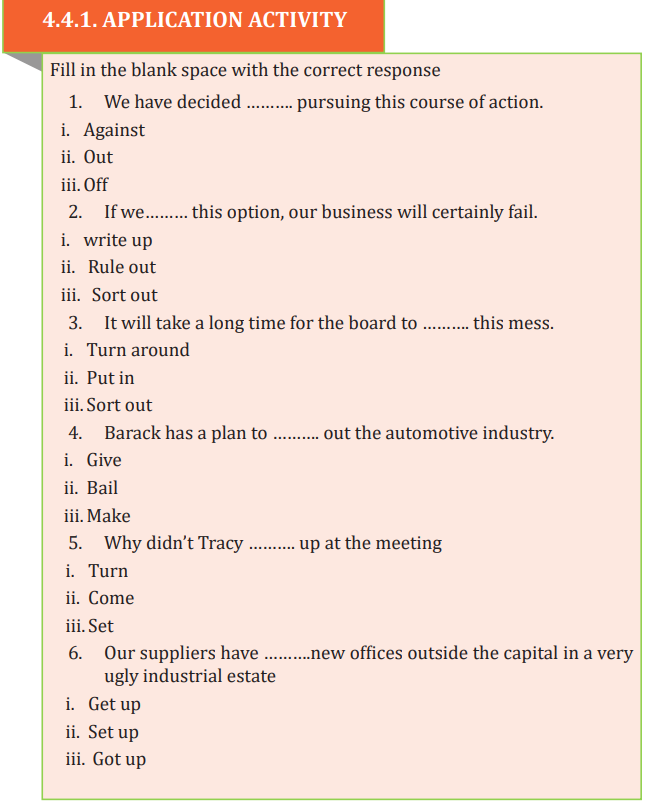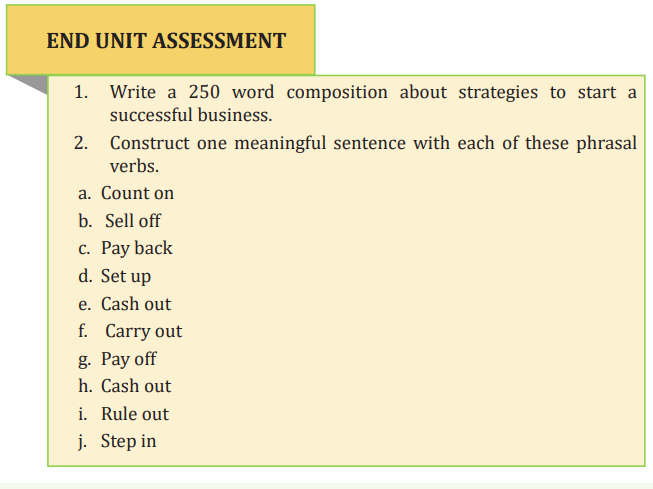UNIT 4BUSINESS AND MONEY
1. To what extent has the previous work experience of Mkami helped her to
get and do her current job?
2. Identify some good advice in this passage for young people about how to
succeed as an employee or in your own business.
3. On the basis of what you have read in the above passage, what are
advantages of running your own business?
4. Why do you think Mkami has become a successful entrepreneur?LEARNING AREA: ORAL AND WRITTEN COMMUNICATION
Key Unit Competence: To use language learnt in the context of business and money.


Someone once described the age we live in as that of a vanishing world, one in which the familiar is constantly disappearing forever and technological change is often difficult to cope with.
So it should come as no surprise to most of us to hear that yet another part of everyday life is about to go forever. Still, when I read recently that in the next decade money as we know will probably cease to exist in technologically advanced countries, I had to read the article twice to make sure it wasn’t April 1st.
According to Professor Gerry Montague, of the Institute of economic reform, the familiar coins and banknotes will soon be replaced entirely by credit cards of various kinds. And the shop of the future (the ‘retail outlet’-as Professor Montague puts it) will be linked to the network of banking computers.
The assistant will only key in your bank account code number and the amount you have spent, and thank you politely. You won’t have to dig deep in your pocket or wallet for change or pretend at the pub that you have left your money at home. You may not even have a number for your account as such, as the computer may by the end be able to read your handprint.
So, no more credit card frauds either. But I am afraid that I shall waste money. I have felt strongly attached to it, ever since I received my first pocket money when I was five and kept it in a moneybox.
Even if my credit card of the future will be able to tell me exactly how much spending power, I have left in the computer file, even if it lights up and plays a happy or sad tune at the same time, nothing will be able to replace the sheer pleasure I gained from rattling the coins in my moneybox.
Not to mention the other obvious problems which will be caused by a shortage of real money – like how to start a football match for example!
Extracted from Advanced Language Practice by Michael Vice, p.196
• Comprehension questions
a. Examine the impact of current technological advancement on our concept
of money according to the first and second paragraphs.
b. Why did the narrator think it was April 1st when he read that in the next
decade money as we know it will probably cease to exist?
c. Do you think the progress made in bank system will end credit card frauds? Justify your answer.
d. Why do you think that the technological advancement in banking will lead to wastage of money.


Text: Functions of Money
Text: Functions of Money Good money should be acceptable by everyone as a medium of exchange.
This is the prime requirement for money.
The use of money is based on confidence. One is prepared to accept money provided that they are confident that others will also accept it. All transactions are made through the use of money. Previously in the old ages, there was use of commodity and barter system as medium of exchange.
The introduction of money eased the system of exchange because of its good qualities such as portability and divisibility, among others. Good money should be easily divisible in small units.
Whatever physical commodity is being used as money, it must be easy to divide it into smaller amounts to make smaller transactions possible. One should also be able to carry good money from one place to another. It must not be so heavy in relation to its value. It must be transportable in terms of bulk and weight.
Modern money consists of coins, bank notes, cheques and bank drafts. All these must be carried without attracting attention. Good money should be scarce because if it is common, it would lose value due to increase in demand. Its supply must be less than its demand but it must be available.
The value of goods and services and factors of production are expressed in terms of money. Determining the value of a commodity is based on how much an individual is prepared to pay for it. The higher the amount paid for a commodity, the more valuable it is; the lower the amount paid, the less the value, other factors remaining constant. Good money should be similar and difficult to forge.
The features on the same denominations must be the same as on another denomination. Varying degrees of quality will lead to confusion and uncertainty in the public and eventually there will be loss of confidence. Good money must be made of features and quality that cannot be easily forged. Otherwise, forged money will increase money in the economic system which leads to inflation and in turn money will lose value. Money which is forged is called counterfeit money. Wealth or goods can be easily stored for future use in form of money than assets.
It is easy for James is Musanze district to sell Irish potatoes and store millions of Rwandan francs for a period of one year or more than storing one hundred sacks of potatoes. It is easier to store one million Rwandan francs than storing a cow. Many transactions are conducted on the basis of credit where goods and services are sometimes given out on credit. When paying for the goods, it is more convenient to express these future obligations in terms of money.
In a modern society, money is a mechanism through which most goods and services are distributed by use of what is known as the pricing mechanism. Goods can be moved from one place to another mainly from areas of low price to those of high price through a process called arbitrage. All this can be done through price mechanism which uses money.
51 Money can facilitate the physical transfer of property. For example, it may be impossible to move a building from Nyamasheke to Nyagatare but the owner can sell it and easily move with his money to the new area of location.
All business transactions and accounting are made possible by use of money. When computing business transactions, statistics of national income, to mention but a few, money is the most suitable medium. It may be easy to record the amount got after selling a commodity than recording the actual commodity. Adapted from Economics for Rwanda secondary Schools, book five, p.158-159.
Comprehension questions
1. Assess five functions of money as expressed in the above passage.
2. What do you understand by portability and divisibility as qualities of money?
3. According to the passage, why is it important to make it difficult to forge money?
4. What should be done to prevent people from forging money?
5. Examine the role of money in business transactions.


Text: Mkami-The Entrepreneur I always thought I would work for someone else, I never imagined I would be the boss! But that’s how things have turned out for me. I left school with quite a good certificate of secondary education and as I had done well in Mathematics. I managed to get a job in the accounts department of a tourist hotel.
I did this for about four years. Meanwhile, my cousin Jimmy, who didn’t go to secondary school, had trained as a carpenter. He got a grant from SIDO, which is the Small-scale Industries Development Organisation, to set up a workshop and started employing a few untrained workers, who he trained up. Jimmy came to the hotel one day and saw that they had a very poor selection of crafts for sale to guests. He suggested asking the hotel if we could take over the tourist shop.
He would provide the goods and I would run the shop. We managed to get a loan from an investment bank to set up the shop. The bank also gave us a lot of advice and helped us put together a business plan. Eventually, it was agreed that we would pay rent to the hotel and a percentage of the earnings. That was ten years ago. Since then I have done some courses in running a business and that has helped us to expand. We now have a chain of 20 tourist shops in different hotels. The workshop still supplies a lot of our goods but I also travel around the country to find other suppliers.
We have come a long way, and I think the reason for this is that we have asked for advice from the people who know and we listen to our customers. Tourists want to see a good variety of high quality crafts and that’s what we give them. Running a business is hard work and at the beginning you can’t expect to make any money for yourself; all the profit goes into building up the business.
So, you have to have a cool head and be prepared to take risks. We employ 40 people now and have made reasonable livings for our own families, so I am satisfied. I am married and I’ve got one daughter. I haven’t had time to have another. Extract from English in use Book 3 by Longman publishers
Extract from English in use Book 3 by Longman publishers •
Comprehension questions
Answer these questions in complete sentences.
- To what extent has the previous work experience of Mkami helped her to get and do her current job?
- Identify some good advice in this passage for young people about how to succeed as an employee or in your own business.
- .On the basis of what you have read in the above passage, what are advantages of running your own business?
- Why do you think Mkami has become a successful entrepreneur?

4.4. Language structure: Phrasal Verbs.
• Notes Phrasal verbs are multiple-word verbs.
They are made up of the verb and one or two particles. A particle can be either an adverb or a preposition. The majority of phrasal verbs have a fixed meaning; they are idiomatic expressions. Often, the meaning of a phrasal verb is not a sum of the meanings of the words in the phrase. You cannot draw the meaning of a phrasal verb by taking each word’s meaning that makes it. For example, keep up does not mean ‘keep in a high place’.
Examples
Examples
1. The assistant will only key in your bank account code number and the transaction is over.
2. Jimmy trained up most of his workers.
3. A successful business man is one who pays off all his debts.
4. The loan from the bank helped us set up the shop.
5. Jimmy and I built up a joint business for five years.
6. We were advised to pay back our loan on time.
7. Mikami cashed out part of her earnings for personal use.
8. My brother and I set up a good business plan before starting our commercial activities.




